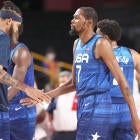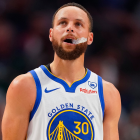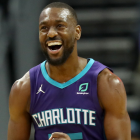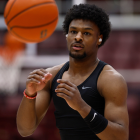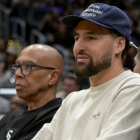
Kevin Durant is not worried. The United States men's national basketball team lost its first game in Tokyo, but there's no panic among the players or coaches, Durant said Tuesday.
"Our adjustment is we just make more shots," Durant said. "We got the best talent in the world on the team."
The best talent in the world wasn't enough to beat France at the Olympics on Sunday. Team USA led for most of the game and had a 74-67 lead with less than four minutes left, but collapsed down the stretch and lost 83-76. France's Evan Fournier, who scored a game-high 28 points, set the tone for the next few days of storylines with a blunt postgame quote: "They are better individually, but they can be beaten as a team."

CBS Sports HQ Newsletter
Your Ultimate Guide to Every Day in Sports
We bring sports news that matters to your inbox, to help you stay informed and get a winning edge.
Thanks for signing up!
Keep an eye on your inbox.
Sorry!
There was an error processing your subscription.
Heading into Wednesday's game against Iran, Durant downplayed the much-discussed chemistry concerns. "We got each other good shots," he said, insisting that their first-half lead, which was never larger than 10 points, could have been much more substantial had they made a few more of their uncontested looks. He dismissed the notion that they need clearer role definition or an undisputed No. 1 option, saying that the situation in Tokyo is the same as it was in his previous go-rounds with the national team. "Every night, it's different," he said, adding that anybody could lead the team in scoring and it's not as if the whole team used to defer to Kobe Bryant and LeBron James all the time.
According to Durant, all of the stars on Team USA simply need to "play off each other" and trust that everyone will shoot their open shots with confidence. They need to be aggressive driving to the basket, unselfish in kicking the ball out to shooters and smart about avoiding foul trouble on the other end.
"We know how to play with each other," he said.
Khris Middleton, fresh off his NBA championship with the Milwaukee Bucks, said the message he's been hearing since his arrival has been consistent: "Be yourself." It is normal, he said, to worry about stepping on other players' toes initially, but this typically goes away when you've felt out the situation and you're more comfortable with your teammates.
"To play with a rhythm, do what we do, that's the only way this thing is going to work," Middleton said.
There were some positives in the United States' opener. They switched effectively, moved the ball and were in control of the game for long stretches. Jrue Holiday was as sharp on both ends as anybody could have hoped, just a few days removed from harassing Chris Paul and Devin Booker, the latter of whom is now his teammate, in the NBA Finals. Holiday, Damian Lillard and Zach LaVine all passed up 3-pointers late in the fourth quarter, though, and Durant fouled out in less than 21 minutes with six points on 4-for-12 shooting.
"Some moments, it's trying too hard to do the right thing," Lillard said postgame, "instead of just being who we are, you know, the best players in the NBA."
Assistant coach Lloyd Pierce said Tuesday that having two days of practice had been helpful. Scrimmages allowed the coaches to look at some different lineup combinations. Team USA is still trying to "figure each other out" and "learn the dynamics of the rotation," Pierce said.
Going forward, there will be an emphasis on creating extra possessions, Pierce said. Opponents will try to be methodical in the halfcourt, but the United States needs to make a point of playing faster and finding easy shots in transition.
"Can we can we speed the game up with our pace?" Pierce said. "Can we create and force turnovers that allow us to get out early? That's where we have to be. If we're going to generate more points, it's going to be that way. You know, the easy answer in the NBA, the 'shoot more 3s, space the floor,' that's not this game."
If the United States is about to start blowing its opponents out the way previous iterations of Team USA have, that's almost certainly how it'll happen. It should surprise absolutely nobody if they have a parade of fast breaks and alley-oops against Iran. Against top-tier teams, though, it's dangerous to be too reliant on the transition game. This is why coach Gregg Popovich has been stressing the "point-five" mentality in practice, and it is why Pierce said that they need to make simple plays "without thinking too much" in the halfcourt.
And there lies the inherent challenge for this All-Star team, which is starting two non-stretch bigs against opponents that are packing the paint with impunity because there is no defensive three seconds rule. More than half of the players on Team USA's roster are accustomed to sizing up the defense in the halfcourt before initiating an action. They are being told to simultaneously be themselves, be aggressive, make quick decisions and sacrifice for each other.
"A lot of these guys are used to a lot of shots, more minutes, more opportunities, and now they're playing with a great player to their right and a great player to their left," Pierce said. "So we need them to be as confident as they always are. We need them to do it as as a unit, and we need them to learn. They don't have to make the same plays that they make on their NBA teams, but they need to have the same mentality and mindset."
Contradictory as that may sound, there is a balance to be found here, and Team USA's commitment to the cause and collective basketball IQ should propel it in the direction of cohesion. The road there, though, is likely paved with some more possessions doomed by overpassing and hesitation. The U.S. just can't afford too many of them.









